People all over enjoy camping and hiking in the woods. Whether you are going for a day trip, or a week long camping adventure, the woods can be one of the most serene places around. People go to the woods to get away, spend time with nature, or maybe they are just looking for an adventure. While the woods can be one of the best places to camp, it is not without its dangers.
Between wildlife, weather, and the vastness of the woods, it is easy to find yourself in a dangerous situation. We will go over how to survive being lost in the woods, and all the information you will need to make sure that every situation is escapable.
Preparation: The Name of The Game
No matter what you are doing or where you are going, it is important to always be prepared in case you find yourself lost. While it is impossible to always have everything you will need on you, a few key items can make a life or death difference when it comes to survival in the woods.
Equipment List:
- Water Bottle
- Lightweight Cord (nylon or a similar material)
- Waterproof Matches
- Waterproof Fire Stick
- First Aid (Bandages, Alcohol Wipes, Gauze)
- Utility Knife
- Small amount of Aluminum Foil
- Pen / Permanent Marker
- Whistle
- Small Collapsible Pot
- Protein Bar
With the above listed items you will be prepared for most all situations, and have the necessary gear to get through most survival situations. Make sure that wherever you are going, you have a highly detailed map of the area you will be going to as well as a compass.
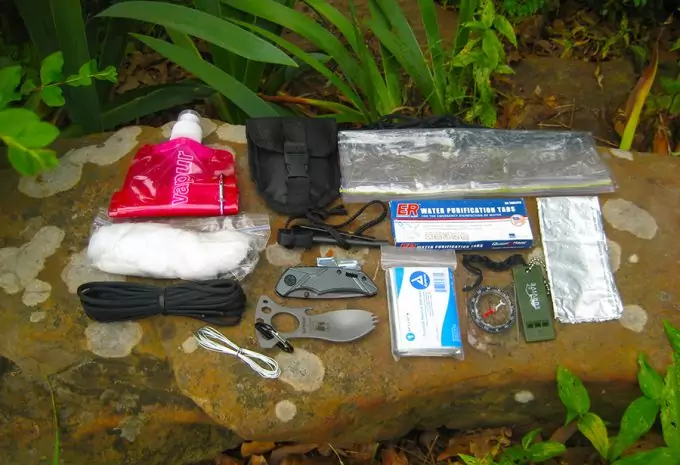
These are lifesaving items that are necessary any time you are hiking, camping, picnicking, or doing anything else in the woods! A final note of preparation: anytime you are going into the woods you should tell a friend or family member where you will be going, and for how long you will be gone. This will make sure that someone will eventually start looking for you in the event you get lost.
Our comprehensive piece on the top bug out backpacks will give you more options and keep you safe before hitting the trail.
Now let’s go over what to do if you find yourself lost in the woods.
Stop and Evaluate
If you find yourself wandering around for a while, trying to find your way back to the path, and suddenly realize that you have no idea where you are anymore, then you need to STOP. The moment that you think you might be lost you should stop and get your bearings.
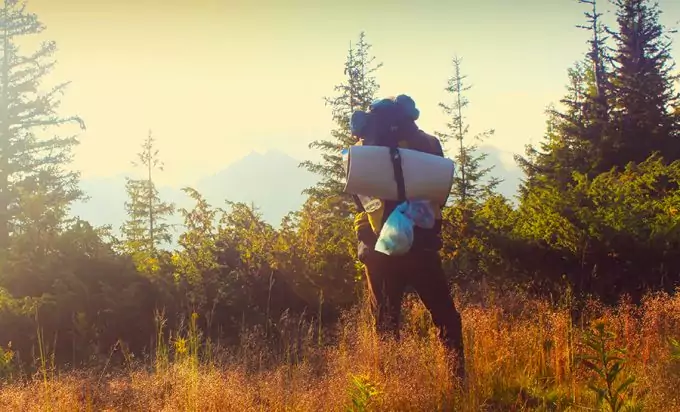
The more you walk, the more lost you will become, you have a better chance to go deeper into the woods than you do getting to back your campground or trail.
What time is it?
Your first action should trying to figure out what time of the day it is, and how close you are to night. If you do not have a watch on you, then you will need to use your compass to determine what section of the day you are. If you’re looking for a reliable compass, see our article listing the top compass in the market to give you the best product.
Using your compass, determine which direction is North and then determine where the sun is relative to North. Remember that the sun sets in the West and rises in the East, so once you know where North is, you can determine which portion of the day you are in and how much longer you have until night falls.
Prepare for Night
If it is getting close to night, you will need to immediately begin preparations for nightfall. The last thing that you want is is to be caught unprepared. Depending on which part of the world you are in, nighttime can mean extreme drop of temperatures.
The first thing to do is to set a point to come back to. Use a landmark like an odd looming tree, a large rock, or something to that effect. Once you have set your starting point, move in direct line of sight of your landmark to collect fire wood and anything that could be used to help.
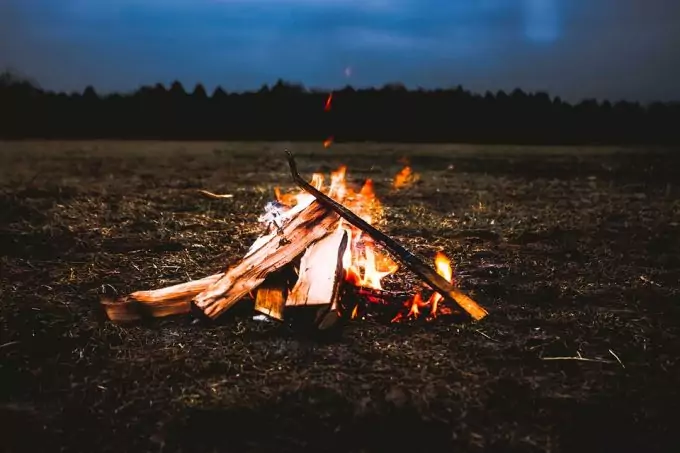
This includes any sort of items that may have been left behind by other people, or anything could be used for shelter. Try to search for a body of water or a cave when you are moving within line of sight of your starting point.
Once you have collected enough firewood and found a place to shelter for the night, your next step is to start a fire as soon as possible. This provides you with extremely necessary warmth and will give off a large amount of smoke that can serve as a beacon for anyone who might be looking for you.
One of the biggest killers when it comes to being lost in the woods is hypothermia. Yes, even in summer! People die every single year traveling around mountainous regions during the summer because they are not prepared for how cold it can get when night falls.
Shelter
Finding shelter is one of the most important parts of survival in the woods. One of your first priorities should be finding some sort of shelter to protect your from all the elements. Shelter can come in all shapes and sizes.
Ideally, you might be able to find an uninhabited cave, but that would be rare. Most caves will already have some animal who has called it their home, so if you find any caves make sure there are no signs of something else living there.
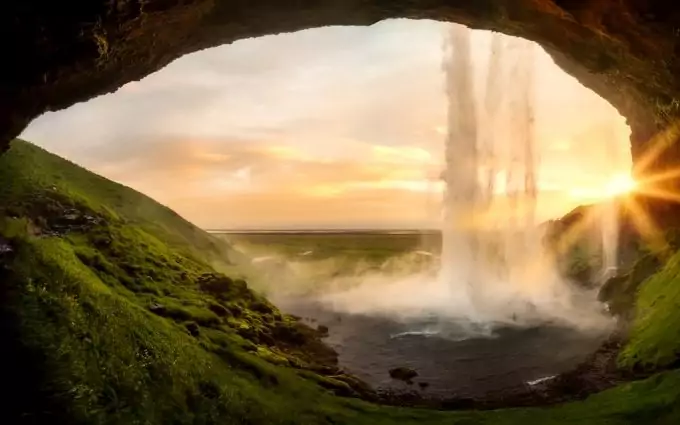
If you cannot find a cave, you are more than likely going to need to create your own shelter. For this you will want to look for a fallen tree that has enough space for you to fit underneath.
Once you have found your tree, you will want to cover one side of the area with strong branches and wood that can then be covered with any sort of brush (palm leaves, shrubbery, fronds, or other plants). Lash together the branches and leaves with your cord from your survival kit.
Make sure that you cover as of the shelter as you can, and then create a bed of leaves and brush for you to lay on as well. A shelter should be providing you with both warmth and protection from rain, sleet, snow, or even the blistering heat of the sun. Do not make your shelter too hidden though, you want people looking for you to be able to find you.
Water
A human being can survive up to three days without any water, so whatever water you have when you start off should be rationed, but not too harshly. Finding fresh water can be extremely difficult in the wild, but it is important that you find some form of fresh water in order to survive. Our article on how to purify water without a filter will help you a lot, so check it out.
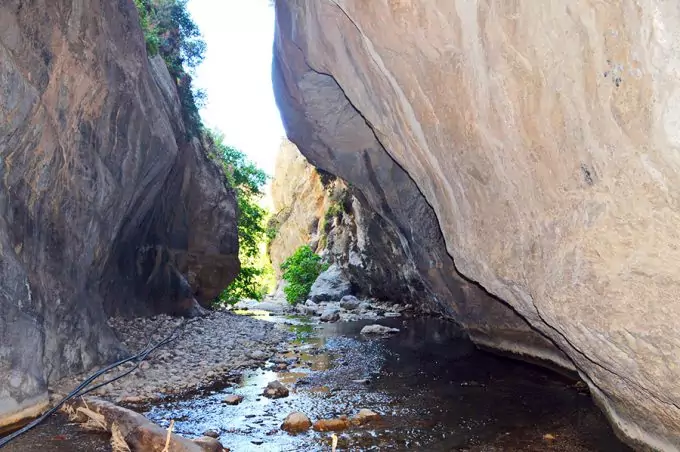
Fresh water springs are the most ideal forms of fresh water, but unless you are camping in very specific areas, your chances of finding a fresh water spring are very low. But do not worry there are other methods that can be used to find drinkable water.
- Streams: Finding a running stream or river is your next best option when it comes to fresh water. Look for a place where birds are converging on a location. Birds stay near sources of fresh water in order to survive. If you find a running stream, do not immediately start drinking from it. Although streams can be excellent sources of water, they are not always going to be readily drinkable.
Check the quality of the water by checking the amount of sediment that is in the water. While this is not a perfect test to see if the water is drinkable, you will have a better shot at not getting sick the less sediment there is in the water. - Rain Water: If you find yourself in the middle of rainy season it may be extremely uncomfortable, but the bonus to this is that you will be able to collect really clean drinking water. Set up as many possible containers as you have including leaves, hats, your foil, and your water bottle to collect any falling water.
- Purifying Water: If you have found water but do not trust whether or not it is drinkable, boiling can solve your problem. Using your small pot and your fire you can boiling water to purify it. The water needs to be at a full boil for at least three minutes before it is clean to drink. Let the water cool down and then you will be ready to drink fresh water!
Alternatively, if you do have a pot or foil to mold into a pot you can use a clear water bottle to purify the water. Fill your water bottle to the brim and then leave it out in the sun for at least 6 hours. While this is not perfect for purifying the water it will be better than nothing!
Before leaving for your camping adventure, ensure that you have the best compact water filter inside your backpack. Find out the top ones by clicking on the link.
Energy and Food
When you are lost in the woods, you never know how long it will take for someone to come find you, or god forbid, how long it will take you to get back to civilization. The first instinct you will have is to panic and start running around, trying to find your way back, but do not make this mistake.
When it comes to survival in this situation, you must do your best to conserve your energy. Food and water are both going to be scarce and you will just make things worse if you strain yourself further.

Finding food can be one of the biggest challenges when you are lost in the woods. There are certain wild plants that you can eat that can help you, as well as methods such as fishing. Unless you run into a strawberry bush or a very obvious berry bush, avoid eating berries completely.
There are way too many poisonous berries for the risk. The same can be said for mushrooms. Some foods that you can eat are:
- Dandelions are one of the best plants to find for easy nutrition. All you need to do is remove the stem from the flower and eat the flower and yellow leaves.
- Insects and other bugs. While gross, can be an excellent source of protein for you when you are in the wild. While they may not be the most appealing food to eat, bugs can provide you with lifesaving protein when you are lost. Insects should be 100% cooked before you eat them, so put that foil to use! Make sure to remove the heads, legs, and wings as well. Whatever you do, do not eat any bright insects, caterpillars, or insects that have stingers. This includes bees, spiders, wasps, etc. Grasshopper are your best bet for quick protein.
- Fishing can be an amazing way to get food when near running water or a lake. However, never go too far away from your shelter. If you need to fish you can make a make shift fishing pole using cord and a long branch. Tie a bug to the end of the string and hope that you catch something.
Getting Yourself Rescued
While survival should always be your number one goal, you want to make sure that you are easily rescuable as well.
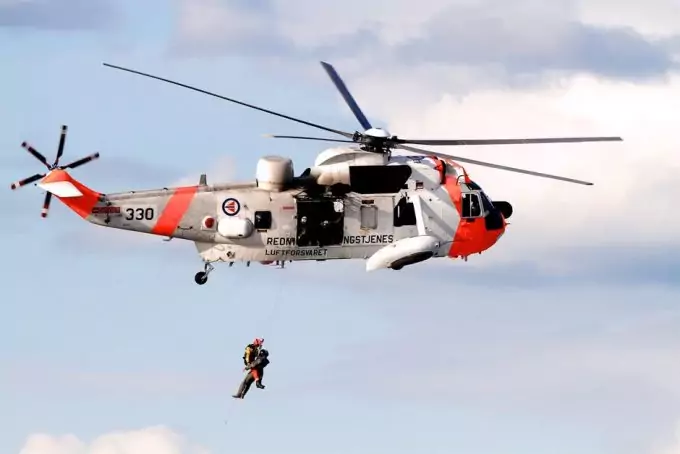
There are certain steps that you can take that will dramatically increase our chances of being rescued.
- Stay near your starting point. The farther off you wander, the harder it will be for rescuers to find you. As long as someone knows that you are supposed to be back at a certain time, you have a high chance of being found. But this requires you staying in the same area.
- The smokier the fire the better. When building your fire add extra leaves and tinder to get your fire really going. The smoke will create an easy to find signal for any helicopters that may be looking for you, as well as alerting ground rescuers to your presence.
- Use your whistle throughout the day to see if any rescuers are in your area. The whistle can be one of your best noise making tools, and requires very little energy to use. Do not constantly blow on it, but make sure to use it regularly.
- Only go looking for help if you know for a fact that no one will be looking for you. If you have to go and look for help, do not travel at night. Try to find a stream or a running source of water and follow it downstream. You eventually will run into a larger body of water, and with that a better chance at finding other people.
No matter what you do, you need to make sure that your stay calm and collected the entire time. Untrained people have survived extremely prolonged times in the wild, and you can to. If you stay in control of your situation, don’t panic, and make the correct choices you will make it through what is an extremely trying situation.

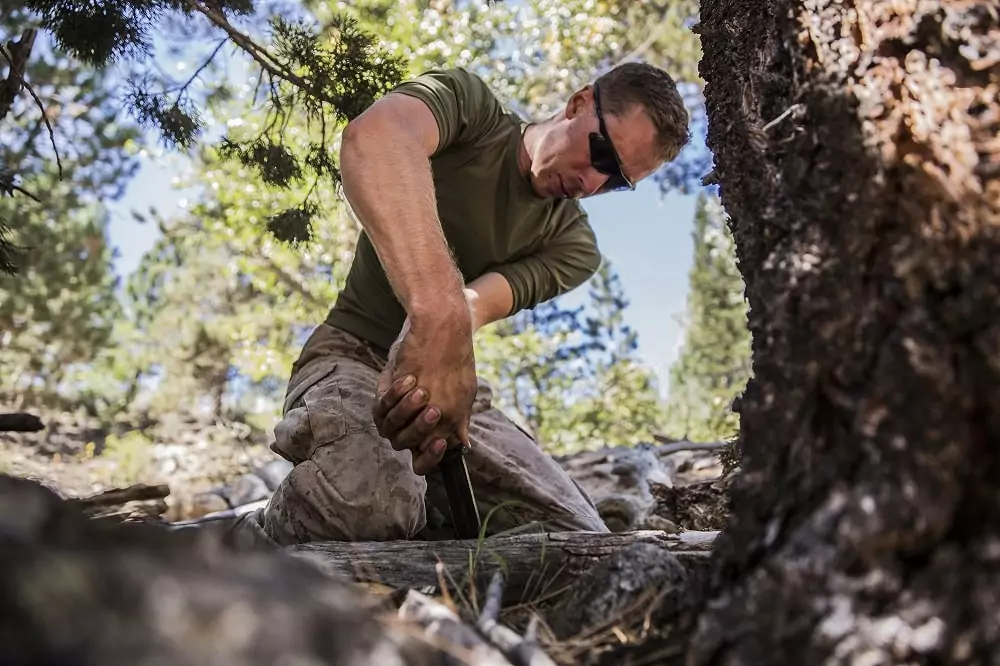

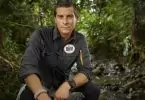


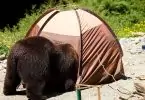

Amen to the “stay calm and collected” summation. Rash actions are rarely wise ones, and can be costly. I like to read things like this for “just in case” in addition to watching survival shows. I have been lost for about four hours in dense forest on a cloudy day, and when I finally found my way out, I was shocked to see how confused and disoriented I was as to my actual location. The map and compass inclusion in your list is so important. I see there is an article on here related to how to use those, as it is critical not only to have one, but to know how to use it, I will be reading that later. Very glad I stumbled across this site.
Glad you find the article useful Tracy! It also helps that you inform a friend or family member of your plans and whereabouts prior to your trips. This will help a lot in case you don’t return at the date you’ve said you will.
Getting lost can be traumatic and life-threatening so you need to psyche yourself up and yes, be prepared and stay calm to be able to think clearly.
I agree that making a decent shelter is top priority when you are lost in the woods because you can die from exposure. Focus on building a shelter then try to find food. By keeping your mind busy improving your situation, you avoid wallowing into negative thinking and panicking. Moreover, staying put while building the shelter can also make it easier for others to locate you.
My tip is to stop moving and get yourself oriented. Check out your surroundings and look for a high spot to check out the trail you’ve left behind. It’s better to stay put than to go further into the woods. Increase your chances of being rescued by signaling like hell. Use your signal whistles, build signal fires, use a signal mirror to catch the eye of rescuers and other hikers.
Be proactive and prepare all essentials prior to camping in the wilds. You need to do that so that if the inevitable happens, you have all that you need. Having a sound mind and body also plays a great deal in survival. So, invest in top-notch gear, learn basic skills to be equipped and above all, don’t panic.
Focus, focus and focus on what’s ahead.
That’s correct. Most lost campers don’t notice that they are going around in circles. You have to take stock on your surroundings and make sure you don’t go further into deeper woods. Also, before going camping, ensure that someone knows where you are headed and when you’re scheduled to go back. Make arrangements with family or friends to take action when you still haven’t gone back for some time.